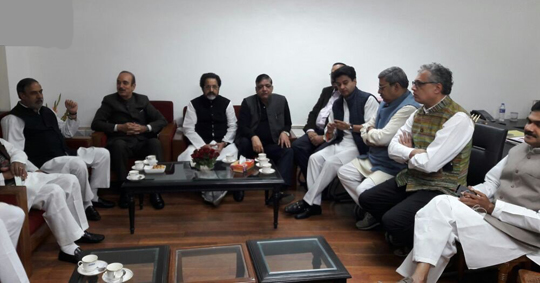New Delhi, Nov 28: On a day they were observing 'Jan Aakrosh Diwas' to protest demonestisation, opposition parties today held a strategy meet where they decided to continue their stir in Parliament till Prime Minister Narendra Modi replies to their concerns and a JPC probe is announced in alleged leak of the decision.

A meeting of all the opposition parties, barring JD(U), was held in the chamber of Leader of Opposition in Rajya Sabha Ghulam Nabi Azad in Parliament House here and it was decided that the protests will continue till their demands are met, sources said.
However, some fissures also appeared in the opposition as the JD(U) skipped the meeting with sources saying party leader Sharad Yadav had left Delhi early this morning.
The opposition parties have been divided over the ways to protest against demonetisation ever since Trinamool Congress chief Mamata Banerjee decided to march to the President against it.
While she was joined by AAP, National Conference and Shiv Sena, an NDA ally, other opposition parties stayed away.
Shiv Sena has backed demonetisation but said it is unhappy over the way it was causing problems to people.
LS adjourns amid Opposition protests over demonetisation issue
A vociferous Opposition in the Lok Sabha today continued their protests against the government over the demonetisation issue, forcing adjournment of the proceedings till noon.
Soon after the House expressed its condolences over the death of Cuban revolutionary leader Fidel Castro, Oppositon members, including those from the TMC and Congress, demanded that they wanted to speak on the demonetisation issue.
With Speaker Sumitra Mahajan declining their request and saying that the matter could be taken up after Question Hour, Opposition members trooped into the Well holding placards and shouting slogans against Prime Minister Narendra Modi as well as the government.
"No placards please... No papers," Mahajan told the protesting members and also reminded them that it was against the rules.
Over 30 members, including from Congress, TMC and the Left parties, were in the Well while members of AIADMK were seen standing near their seats.
Amid the din, the Question Hour went on for around 20 minutes and saw four questions as well as supplementaries being taken up. With the protests continuing unabated, Mahajan adjourned the House till noon.
Opposition parties have been stepping up their protests against the government's decision to withdraw old Rs 500 and Rs 1,000 notes and are also observing 'Jan Aakrosh Diwas' across the country today.
Lok Sabha has witnessed a virtual washout of proceedings since the Winter Session started on November 16 due to the protests over the demonetisation issue.
Oppn protests over demonetisation continue in RS
A united Opposition today continued to disrupt proceedings in Rajya Sabha over hardships caused to the people due to demonetisation of 500 and 1000 rupee notes, forcing two adjournments in the pre-noon session.
Congress, TMC and BSP members trooped into the Well shouting slogans against the government, forcing proceedings to be adjourned first for 30 minutes and then till noon.
Soon after the House mourned the death of Cuban revolutionary leader Fidel Castro and the listed papers were laid, Naresh Agrawal (SP) said nationwide protest is being observed today against demonetisation that has caused hardships to common man.
'All India Protest', called Aakrosh Diwas, has been called to highlight the hardships, he said as other opposition leaders including Mayawati (BSP), Derek O'Brien (TMC), Sitaram Yechury (CPI-M), Anand Sharma (Cong) joined in.
Leader of Opposition Ghulam Nabi Azad said the nation was seething in anger over the hardship and harrassment caused because of the announcement made by the Prime Minister Narendra Modi on November 8.
Soon Congress and TMC members trooped into the well of the House shouting slogans against the Prime Minister. Ruling benches also joined him by shouting slogans favouring start of a discussion on the issue.
I&B Minister M Venkaiah Naidu rose to state that the discussion which had started on the opening day of the Winter Session of Parliament on November 16 and has not yet concluded, should be resumed, instead of such disruption of proceedings.
Deputy Chairman P J Kurien agreed with the suggestion of Naidu but the din continued, forcing him to adjourn the proceedings for half an hour.





Comments
We are expecting a massive protest from Opposition parties. As Mr. MMS said in his speech that recent demonetization scheme implementation was a monumental mismanagement failure and organized loot, legalized plunder of the common people.
Add new comment